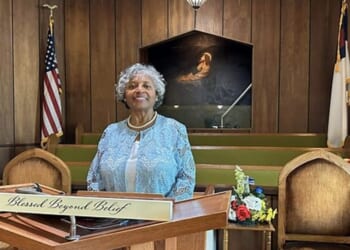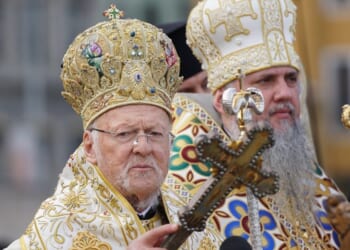Since the Feeding Our Future case has exploded into the national news, I thought I would take the liberty of republishing this sidebar on the issues implicit in the two Feeding Our Future trials held in the case so far and in the 2016 trial of defendants who were convicted of material support for terrorism. This might warrant republication every month for the foreseeable future.
I covered all three trials on Power Line. The Feeding Our Future case involves an almost entirely Somali cast of defendants that has now grown to 78 defendants and 57 convictions. All nine defendants convicted in the terrorism case are Somali. Indictments in one of the Feeding Our Future follow on-cases may dwarf the Feeding Our Future fraud. Those indictments will also feature a large cast of Somali defendants.
Covering the 2016 Somali terrorism trial before Judge Michael Davis in Minneapolis was a rich experience. The case was located at the intersection of Islam, immigration, and terrorism. The group of Somali Minnesotans charged in the case or gone to ISIS in Syria without being charged numbered 12 or 13 or 14. It’s not a small number, and it only represented the Twin Cities’ contribution to the problem.
From the time that I first started following pretrial proceedings, I was struck by the Muhammads involved in the case. They seemed to represent a variation of the town hall meeting in Blazing Saddles featuring one speaker after another named Johnson — Gabby Johnson, Howard Johnson, Samuel Johnson, and so on. Their appearance inverted the Marxist adage. Here history repeated itself, but first as farce, then as tragedy (or something like it).
The first Muhammad is of course the prophet of Islam. Charles Lister was the prosecution’s expert witness at trial. Lister is the author of The Syrian Jihad: Al-Qaeda, the Islamic State and the Evolution of an Insurgency. At trial Lister gave an account of the mess in Syria as of 2016 and of the evolution of ISIS. In his testimony he referred without fail to “the prophet Muhammad.” Prophet or not, he is the man without whom…well, you know what I mean.
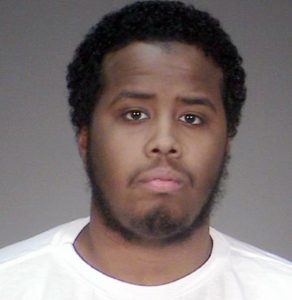 The second Muhammad is Mohamed Farah (photo at right). Farah was one of the three defendants at trial. Like his friends who pleaded guilty or who were convicted along with him, Farah’s recruitment to ISIS didn’t take much. Growing up Muslim in the Twin Cities’ large Somali community, he attended local mosques and supplemented his education with Islamic studies. Adding a large dose of ISIS videos to the mix was apparently enough to move Farah et al. to aspire to live under the caliphate declared by ISIS. He yearned to chop heads and die for Allah.
The second Muhammad is Mohamed Farah (photo at right). Farah was one of the three defendants at trial. Like his friends who pleaded guilty or who were convicted along with him, Farah’s recruitment to ISIS didn’t take much. Growing up Muslim in the Twin Cities’ large Somali community, he attended local mosques and supplemented his education with Islamic studies. Adding a large dose of ISIS videos to the mix was apparently enough to move Farah et al. to aspire to live under the caliphate declared by ISIS. He yearned to chop heads and die for Allah.
In November 2014 Farah left Minneapolis by bus for JFK International Airport to catch a flight that would get him to ISIS. At JFK Farah was intercepted by the FBI. Asked where he was headed, Farah said he was taking a solo vacation to sunny Sofia, Bulgaria. The FBI sent him back home to Minneapolis. He was ultimately arrested in San Diego the following April in the sting conducted by the FBI.
The third Muhammad represented Farah at trial. Murad Mohammad was Farah’s attorney. On the first day of trial Farah sought to replace Mohammad with another attorney. Farah was unhappy that Mohammad had advised him to plead guilty to the charges. Farah told Judge Davis that Mohammad warned him, “Judge Davis will ‘f’ you if you don’t plead guilty.” After interrogating both Farah and Mohammad, Judge Davis denied Farah’s motion.
In 2019 Mohammad was disbarred for failing to handle 11 client matters with the appropriate diligence. He also misappropriated nearly $13,000 from three clients and failed both to return unearned fees to clients and account for the use of clients’ funds. He attributed his misconduct to four murder trials in 2016, a divorce, and single parenting that led to stress and mental health issues. The Minnesota Supreme Court’s disbarment order did not include the names of affected clients, although Mohammad told the Star Tribune that Farah was not one of them.
The fourth Muhammad is a legal assistant who withdrew as a member of Farah’s defense team. His name is Hassan “Jaamici” Mohamud. Mohamud wore many hats. His home base is the Minnesota Da’wah Institute, where he serves as the imam. Mohamud was born in Somalia. He memorized the Koran at the age of thirteen. He is an expert in Islamic law. In 2009 the local FOX affiliate found Mohamud advising Muslims to avoid the “hellfire that comes with living in America.”
Mohamud turned up on the recordings made by informant Abdhirahman Bashir. Before trial the prosecution put defendants on notice that it intended to introduce a recording that cited Mohamud’s instruction in the battlefield prayer for jihad. At the hearing Judge Michael Davis held on this matter, Mohamud and his boss (attorney P. Chinedu Nwaneri) resolved the issue by withdrawing from the defense. I wrote about the hearing in “Sheikh Hassan’s retreat.”
As a result of the hearing, we learned that Mohamud had sought to persuade Abdirizak Warsame against pleading guilty. In connection with the hearing Warsame attorney Jon Hopeman filed an affidavit setting forth Mohamud’s efforts to interfere with the deal Hopeman had worked out on behalf of Warsame. On the evening before Warsame was to plead guilty, Mohamud counseled Warsame “that all the defendants should stick together and go to trial, and if they did, good things would happen.” Hopeman, it should be noted, is a prominent and respected member of Minnesota’s defense bar. In his remarks to Judge Davis, Murad Mohammad told Judge Davis that he had emphatically warned Hassan Mohamud not to speak to defendants other than Farah. It was among the first points that Mohammad made.
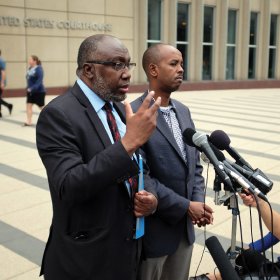 Before his disgrace in this case, Mohamud would frequently turn up in the news as a Somali “community leader.” In the photo at right he was holding forth outside the federal courthouse in Minneapolis in his accustomed style. That’s some “community leader” you’ve got there.
Before his disgrace in this case, Mohamud would frequently turn up in the news as a Somali “community leader.” In the photo at right he was holding forth outside the federal courthouse in Minneapolis in his accustomed style. That’s some “community leader” you’ve got there.
As a “community leader,” Mohamud had been invited to participate in the annual tour of secure areas at the Minneapolis-St. Paul International Airport given by DHS to local Muslim leaders. As Jack Paar used to say, I kid you not. I wrote about the airport tour for Somali “community leaders” in the 2017 City Journal column “Magical Mystery Tour, Minneapolis Version.”
Mohamud took part in such a tour in 2015 but was disinvited before the 2016 tour took place. The Star Tribune reported that the disinvitation discouraged Mohamud “because, he said, his mosque has sponsored several events bringing together Homeland Security and the Muslim community.” Mohamud asserted his disinvitation derived from his criticism “of U.S. anti-terror tactics in Minnesota.” On the contrary, however, it’s probably what got him invited in the first place.
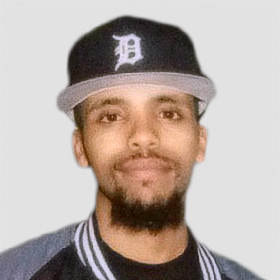 The fifth Muhammad turned up late in the trial. His name is Burhan Mohumed (photo at right). Mohumed is a Somali “community organizer” and friend of defendants. He faithfully attended the trial to support his friends.
The fifth Muhammad turned up late in the trial. His name is Burhan Mohumed (photo at right). Mohumed is a Somali “community organizer” and friend of defendants. He faithfully attended the trial to support his friends.
Mohumed was removed by marshals three times for violation of the protocol prohibiting cell phone use in the courtroom. He was brought before Judge Davis when he got involved in the fight that broke out in the hallway outside the courtroom one morning right in front of me. Mohumed refused to let the marshals take his photograph, as Judge Davis’s protocol also required. Mohumed said he had interceded in the fight, trying to break it up. After interrogating Mohumed in open court, Judge Davis banned him from the courthouse for the duration of the trial.
That wasn’t the last we heard of Mohumed. He turned up in the two New York Times stories on the trial. The Times found Mohumed to be a go-to guy to opine on the purported insufficiency of the evidence to support the guilty verdicts returned by the jury against defendants.










